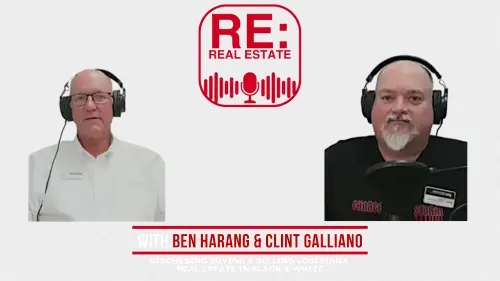Buyers: Pre-Approval Letter
Ben & Clint (00:35)
Good afternoon, Clint. How you doing today? I'm doing wonderful. How you doing, man? I'm doing terrific. It's a sunny Friday afternoon. Life is good. So pre-approvals. We last talked about the first step is to hire a buyer's agent. We spent about 20 minutes talking about that. The next step would be to find a lender that you're comfortable working with.
and sit down with them, chat with them, and get a sense and a feel for your comfort level on what you can afford to spend on a house note. That house note not only includes principal and interest, but it also includes insurance and property taxes. So just because you're qualified for something doesn't mean you're comfortable spending that. So find your comfort level with a lender that you're comfortable with.
And once you all have a five or 10 minute conversation, they'll be able to give you a letter of pre-approval. And then we can go find a house in that price range. So we're not looking at houses that are below your price range or above your price range. we can look at three or four houses and you can pick one and we can start the process of getting you to the closing table.
Yep, that's a fair description. Heck, that almost covers the whole topic. And we're less than two minutes in. was that good? It was pretty darn good. So my point of view, the pre-approval letter, A, it helps us understand where the buyer can work with, you know, so
what their budget is, what they can afford. We want to make sure that the lender is taking into account, like you said, the ancillary costs that go into making the home purchase. So your taxes, your insurance, homeowners and or flood if needed. And we want to make sure that they're using realistic numbers to come up with that pre-approval amount.
Now, just because a buyer can afford a certain amount doesn't necessarily mean that they want to focus on hitting that top number. They may be looking more at a monthly budget. So just because they're pre-approved for a certain amount doesn't mean that we're going to be shopping for that value of home. And we'll generally get an updated pre-approval based on the offer that we're going to make for the home that we're looking at.
So we're not necessarily maxing out their budget. We typically have a price range for what they're looking at to fit that monthly budget that they're trying to stay in. Yeah, sorry about that. I stepped on you. from a negotiation standpoint, we try to get a letter to match the offer that we are making so we don't give away any trade secrets in the negotiations.
You know, like you said, just because you can't afford something doesn't mean you're going to spend that much. But if a seller understands or thinks you can afford it, then they'll try to max you out. And that's when it becomes problematic. So we try not to the clue the sellers into what your ultimate pre-approval is. But we'll just match it. And if we get a counter, we'll just get a new letter from the lender.
Now lenders are not created equally. So you need to just like when you when you're looking for a real estate agent, look for a lender that that you're comfortable with that will return your call, that will talk to you, that will hear your concerns and you know, they're on your side. They have multiple loan products, whether it's a conventional or an FHA or an RD.
Rural Development USDA, a VA, a veteran's loan. You know, and it's a function of your credit score, but it's not completely based on credit score. So, you know, I try to stay in my lane. I would typically give you three lenders that have successfully closed loans from previous clients.
And you talk to them and see who you're comfortable with, whether you call one, two, or all three of them, or call somebody else. You know, I'm not in the business of moving you from a lender if you come to me and you pre-approved with a lender. That's who we're going with. You know, if there's a problem, we always have a fallback position. If it's an out of town lender or something, we can always bring you back local if we need to.
Yep. And I work with a lot of buyers that use out of town lenders, lenders specifically. And I find that I tend to have to do a little bit more with an out of town lender, but I have a relationship with that lender and so it's beneficial to me to help facilitate the deals.
Yeah, and then the local lenders, we've got quite a few locally between banks and market brokers and individual lenders that, you know, there's a lot to choose from. While they all may carry the same products or offer the same or very similar products, they may not have the same rates. They may not have the same fees. They may not have the same costs.
And it's up to the individual buyer to explore those costs and see what they are and see if it fits with what their goals are so that they can decide on whether or not to proceed with one lender over the other. And I guess the key message there is they can proceed with all three as far as getting a pre-approval and it does not impact their credit score.
I know a lot of people are worried about that credit score, especially if it's on a borderline threshold. They specifically do not take a hit if they're getting their credit checked with various lenders. Ideally, you would want to have a lender do a soft pull so that you don't get all the ancillary knock-on pitches from, I guess you could call them the
the shark lenders say, we'll give you this rate that might be 2 % below what everybody else is offering, but then they might have 10 times the fees associated with that loan and you wind up paying more for it in the long term. So with the soft-pull, it doesn't show up on your credit score. They get the information they need to give you the pre-approval and you're set up to go forward. And again, as always, when talking about things that are not
part of the real estate agent's job. The caveat is I'm not a lender. I'm not a loan officer. I didn't sleep in a Holiday Inn Express last night and I don't play one on the internet. One other thing to think about is if you know and the reality is you get pre-approved by a lender and then we look for a house for a month or so and we come across one that has
incentives for you as the buyer. If you use a certain lender and a certain title company to close, and then you just need to price that out and see if you really are getting a better deal. If you accept those concessions or if it's marked up so much to pay for the concessions, you're better off going with somebody else with a different rate. So.
And we can sit down with you and look at the differences and give you our opinion about what we think you should do, but ultimately it's your decision since you're going to be the one that's paying for the house.
And in addition to that, it doesn't hurt if you get a spectacular offer from a lender, ask them for a an estimate, closing estimate or disclosure and shop that to the other lenders you're working with. They'll happily look at it and tell you, especially the local lenders, and they'll tell you if they can match it or beat it. It kind of seems like
You know, may feel like you're trying to pull one over, but you're not really pulling one over. You're just shopping for the best deal for your money. And most lenders will be happy to work for your business. And so they'll evaluate that offer and tell you how their products compare to that particular offer. you, you, talked about local lenders and we mentioned out of town lenders.
The thing I like about local lenders is besides it helps the local economy. It also gives us somebody can sit across the desk from and talk to. We have a track record with them. We, we know, you know, somebody's gonna, gonna misrepresent something to us. They're not going to be on my list that I'm going to give you for the lender. The lenders I'm going to give you are people that I can call and talk to. And I feel like they're going to tell me the truth.
which is what we always need. I've been led down the road with some online lenders that people never had a chance to buy the house and they were just hoping something would happen. And we get to three days before closing and they just say no and they quit returning phone calls and emails and we left out a call. That doesn't happen with a local lender. Things can still go south, but we get a heads up. don't ghost us.
We typically can work through whatever issues that come up.
Yeah, pretty much.
Ben, what else do you think we can cover about pre-approval for financing? Well, there's a difference between a pre-approval and a pre-qualification. Pre-qualification really means you had a conversation with a lender and they took your word for everything. How much money you make, which bills are, whether you ever file bankruptcy or not. They don't do any checking at all.
is based on what you tell them. They run it through a calculator and it puts a number out at the bottom. That's a pre-qualification. it really does is tells us that you had a conversation with somebody. A pre-approval takes it a step further and they verified all of the information, but they don't have an approval because they're waiting on a purchase agreement.
It has to appraise, has to have a clear title, so they're not going to commit to an approval. But a pre-approval means they took it a step further. We do have a local bank in town that does not do pre-approval letters, but they'll get a full loan approval in a week. It's like, so that's the three steps. Pre-qualification is the
Easiest to get and the least meaningful. Pre-approval means they dug into it a little bit deeper. Loan approval means once they tell you you have loan approval, they have to make you that loan unless the situation changes. They can't just change their mind. So those are a little more difficult to deal with, but with a conversation with those people and people in the market know who they are.
We have a conversation with the lender. They tell us their opinion about whether or not they think it can happen or not. And I use that as good as a pre-qualification letter. When we're looking at houses, we know what price range to look in. And those are usually commercial people that flip houses or investors. So it's a little bit different than a 30-year fixed rate secondary home loan that we've been talking about.
So that's just an aside. It's a different kind of lending sometimes.
So I think we're about covered at all, Clint. I think so. OK. Well, until next time, have a good weekend. You too. Enjoy yourself. Yeah, you too. Talk to you later. Thanks. Bye bye.
Creators and Guests



